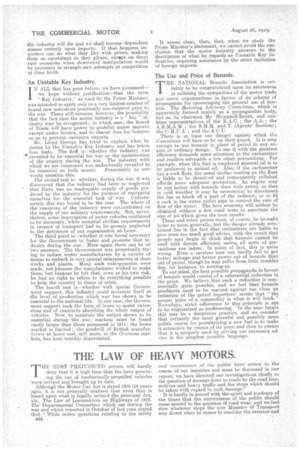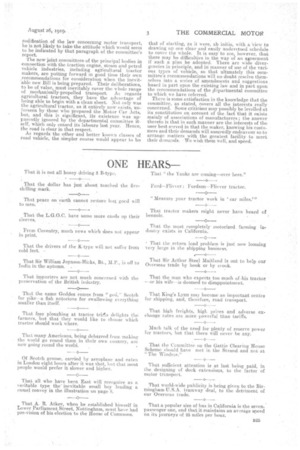THE LAW OF HEAVY MOTORS.
Page 2

Page 3

If you've noticed an error in this article please click here to report it so we can fix it.
THE MOST PREJUDICED person will hardly ' deny that it is high time that the laws governing the use of inechanically-propelled vehicles were revised and brought up to date. Although the Motor Oar Act is dated 1903 (16 years ago), it IS not ,generally realized that even that is based upon what is legally. termed the principal Act, viz., The Law of Locomotives on Highways of 1878. The Departmental Committee which sat during the war and which reported in October of last year stated that "While minor questions relating to the safety B24 , • and convenience of the Public have arisen in the course of our inquiries and must be discussed in our report, we have directed our investigations chiefly to the question of damage done to roads by the road locomotives and heavy traffic and the steps which should be Wren with regard to such damage.'
It is hardly in accord with the spirit and tendency of the times that the convenience of the public should come seeend to the question of road wear, and we feel sure whatever steps the new Minister of Transport may direct when he comes to consider the revision and
codification of the law concerning motor transport, he is not likely to take the attitude which would seem to be indicated by that paragraph of the committee's report.
The new joint committees of the principal bodies in connection with the traction engine, steam and petrol vehicle industries, including agricultural tractor makers, are putting forward in good time their own _recommendations for consideration when the inevitable new Bill is being prepared. Their deliberations, to be of value, must inevitably cover the whole range of mechanically-propelled transport. As regards agricultural tractors, they have the advantage of being able to begin with a clean sheet. Not only was the agricultural tractor, as it entirely now exists, unforseen by those' who prepared the Motor Car Acts, but, and this ia significant, its existence was am parentIy ignored by the departmental committee itself, which only ceased its labours last year Hence; the road is clear in that respect.
As regards the other and better known classes of road vehicle, the simpler course would appear to he that of starting, Os it were, ab initio, with a view to drawing up one clear and easily understood schedule to cover the whole. It is easy to see, however, that there may be difficulties in the way of an agreement if such a plan be adopted. There are wide divergencies in principle, and in manner of use of the various types of vehicle, so that ultimately this earnnrtittee'a recommendations will no doubt resolve themselves into a series of amendments and suggestions based in part upon the existing law and in part Upon the recommendations of the alcpartrnental committee to which we have referred.
There is some satisfaction in the knowledge that the committee, as stated, covers all the interests really concerned. Some eritieiain may possibly be levelled at its constitution on account of the fact that it exists mainly of associations of manufacturers ; the answer thereto is that in such manner are the interests of the user best served in that the maker, knowing his customers and their demands will assuredly endeavour so to arrange matters with the greatest facility to meet their demands. We wish them well, and speed.
























